Chemotherapy
Chemotherapy is a systemic cancer treatment; in other words, it is a treatment that acts on the tumour and other possible cancerous sites by preventing the proliferation of abnormal cells throughout the body.
Chemotherapy can be used alone, in combination with radiotherapy, after surgery (it is then referred to as adjuvant therapy) or prior to surgery (this is called neoadjuvant therapy). Most treatments are administered by perfusion, some are given orally.
Chemotherapy does not generally require hospitalisation and is scheduled in a cycle of one to several consecutive days separated by a period of one to four weeks (rest period). This is called outpatient chemotherapy.
This treatment is recommended after your file has been examined by a group of experts during a multidisciplinary team meeting, according to international recommendations. Your GP and surgeon will be regularly informed on how your treatment is progressing.
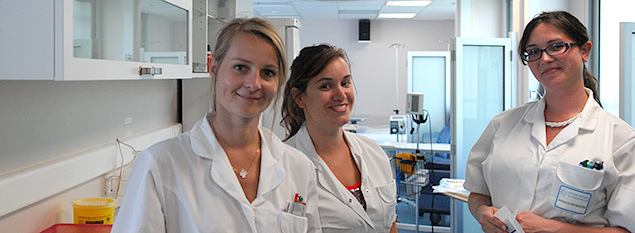
Nurses in the chemotherapy outpatient ward
What happens in the chemotherapy outpatient ward?
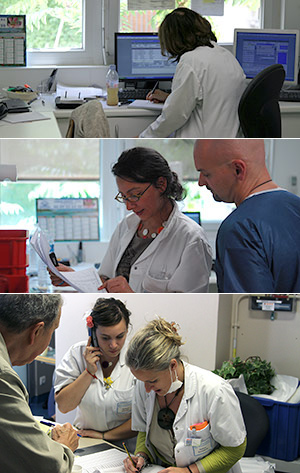
Preparations are controlled by pharmacists, a nurse
and the chemotherapy treatment supervisor.
Drugs are chosen in relation to your pathology. The dose is administered according to your height, weight, your general state of health and medical history. The duration of the perfusion depends on the drugs prescribed.
The treatment comprises several injections given at set intervals. Each cycle is called a course of treatment. Your oncologist will give you details of these different aspects during your consultation; then a nurse will re-explain and provide supplementary information prior to your first treatment session. You do not need to have an empty stomach for the chemotherapy drugs to be administered. If you are taking medication, inform your oncologist to avoid any adverse interactions.
Perfusions are administered through a drip into a vein, or through a chamber (a port-a-cath), which is implanted under your skin in the operating theatre (under local or general anaesthetic) by a specialist doctor, and remains in place throughout your treatment. The nurses then put a needle through the skin into this chamber to administer the chemotherapy drugs. It is possible to apply an anaesthetic patch to numb the area one or two hours prior to the injection so that you don’t feel any pain when the perfusion is administered.
A recent biological test is often necessary, so don’t forget to bring your latest laboratory test results.
Where will the treatment be given?
The treatment will be given in a specialised outpatient ward, called the “Day Clinic”, situated on the 1st floor at 30 Rue de Paris. If necessary, don’t hesitate to contact us on +33 1 41 10 27 17.
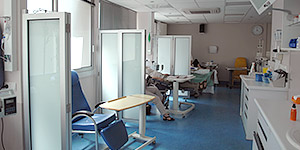
Day Clinic chemotherapy outpatient ward
Our establishment has 20 stations in the chemotherapy outpatient ward.
Over the year, the “Centre de Cancérologie de la Porte de Saint-Cloud” deals with over 8,000 hospitalisation days in the chemotherapy day clinic.
What is more, if your state of health so requires, in coordination with your GP and oncologist, we can organize for your treatment to be given at home thanks to agreements entered with various entities.
What are the adverse side effects of chemotherapy?
According to the type of chemotherapy, adverse side effects can differ.
For some years now, very effective products enable adverse side effects to be alleviated or eliminated.
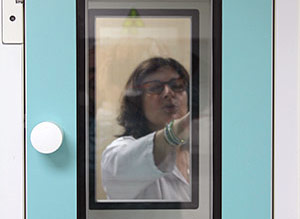
Managing pharmacist in the airlock chamber
of the anti-cancer drug preparation control office
These treatments, called premedication, will be administered through a venous cannula during chemotherapy. Others are to be taken prior to or just after the chemotherapy session in tablet-form or by injection. Your oncologist and nurses will explain the best way to proceed.
Feeling tired is quite common in the days following the perfusion. However, continuing with your usual activities is absolutely possible, and even desirable, between your courses of treatment.
Certain chemotherapies may result in your hair falling out. Your doctor will talk to you about this and possibly prescribe a cranial prosthesis (a wig). When the treatment stops, your hair will grow back.
How are your chemotherapy drugs prepared?
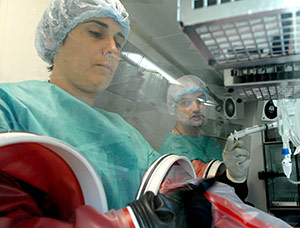
Pharmacy technicians in the anti-cancer drug
preparation unit (UPAC)
The pharmacy at the “Centre de Cancérologie de la Porte de Saint-Cloud” has a Centralised Reconstitution of Cytotoxic Drugs Unit (CRCDU) where sterile preparations are made for chemotherapies prescribed for patients.
The unit handles over 14,000 chemotherapy preparations per annum.
This unit has a team of two pharmacists and three pharmacy technicians, all of whom are specialised in anti-cancerous chemotherapy treatments.
Computerised management set up between the different departments ensures named traceability of each file.
The main tasks of the Centralised Reconstitution of Cytotoxic Drugs Unit are:
- individual daily dispensing of hospitalisation medicines and checking prescriptions;
- centralised preparation of chemotherapy drugs in an isolator, carried out in optimal safety conditions guaranteeing their composition and sterility. Each preparation is unique and intended for a single patient;
- best adapting the treatment to the patient during each course of treatment (in collaboration with the medical teams) in relation to the pathology, general state of health and tolerance to chemotherapy courses of treatment previously administered;
This unit complies with standards not only for premises and equipment but also the requirements of a strict Quality Assurance System.
